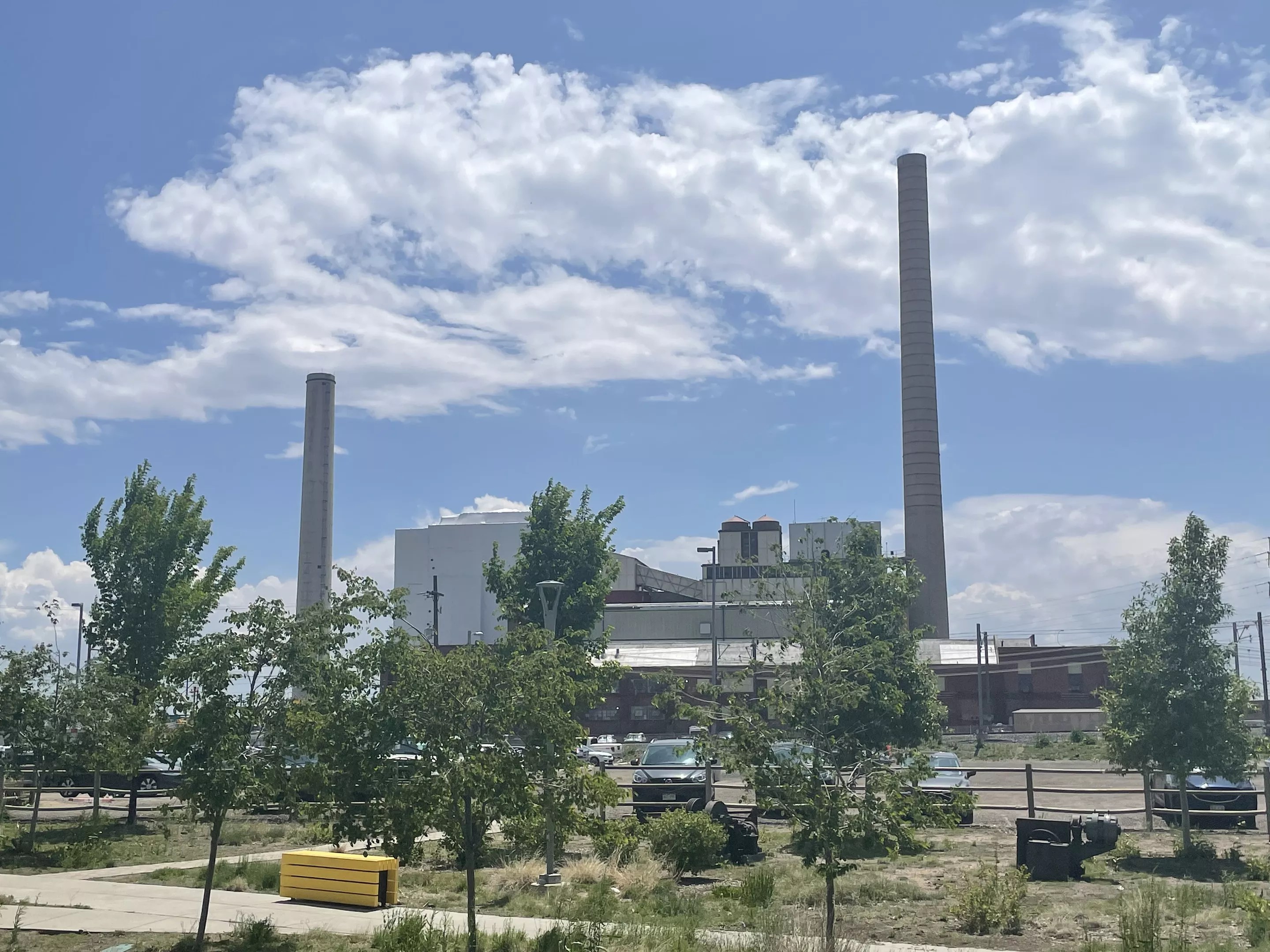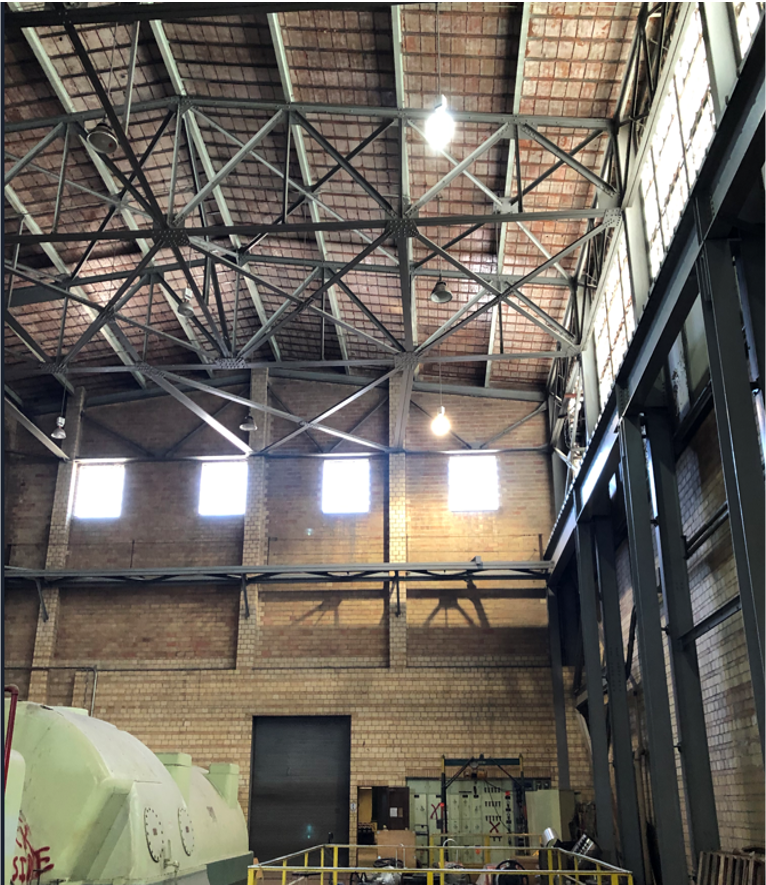
Catie Cheshire

Audio By Carbonatix
Although Xcel Energy has delayed destruction of the Zuni Generating Station, Sun Valley and La Alma Lincoln Park residents want the company to go further by partnering with the community to decide its fate.
In the time since the energy giant offered a one-year moratorium on razing the building, the community has cultivated its vision for what’s possible in the space – without any collaboration from utility officials.
The steam plant, which sits on a seven-acre plot of land owned by Xcel on the east bank of the South Platte River at West 13th Avenue, was retired in 2015. But in January 2021, the Colorado Public Utilities Commission approved a plan to decommission it and conduct environmental remediation at the site. That plan, however, would ultimately result in the building’s destruction.
The move wound up raising red flags in the community, with many hoping the building would be used to promote access to food in the nearby neighborhoods of Sun Valley and La Alma Lincoln Park. Thanks to attention from Denver City Council and Historic Denver, on July 26, 2022, Xcel promised to wait a year to demolish the building.
“What I can understand in the six months I’ve been here is that we haven’t been at the table as much as we should,” Grace Lopez Ramirez, senior area manager for community and local government affairs for Xcel said at the time. “​​We’re committed to making sure that we’re listening and we’re working with you in the community, in the city, on the future of this planet.”
But the community hasn’t heard much from Xcel, according to Susan Powers, president of Urban Ventures, which redeveloped a historic building across the street from the plant into STEAM on the Platte, a multi-use space for community and business.
So on May 25, the community organized its own forum at Raíces Brewing Company, gathering to learn about the Beloit Powerhouse in Wisconsin, which is another old steam plant that got adapted for community use as the student union at Beloit College. Dan Schooff, vice president of advancement at Beloit, shared how the utility company and the college worked together on everything.
“We went out and visited a power plant in Kansas City,” he remembered. “They turned their coal-burning power plant into a ballet school, so I’m trying to pay it forward here. … Kansas City helped us, we’re going to help Denver.”
Schooff previously worked at the Public Service Commission of Wisconsin, that state’s counterpart to Colorado’s PUC. But when he caught wind of the idea to adapt a steam plant into a space for students, he jumped ship to Beloit College – and has stuck around ever since.
The idea for the adaptive reuse project there started in 2009 and came to fruition in 2020. To build the Beloit Powerhouse, Schooff said the parties had to engage with each other in good faith and recognize each other’s needs. Once they determined what was possible, they entered into negotiations over a definitive purchase agreement – hashing out liability, costs and details over multiple conversations.
After that, construction began, starting with asbestos abatement and the removal of old machinery.
At the Zuni station, asbestos abatement is currently in progress. Powers said during Thursday’s meeting that Xcel has claimed it needs to knock down the oldest wall of the station – the north wall – to remove all of the machinery. Powers asked if Schooff knew of any strategies to prevent that destruction.
Burns & McDonnell, the engineering firm with which Xcel is contracting, is the same firm that worked on the project in Beloit, Schooff said. Originally, the company thought it would have to use cranes, but ended up being able to move everything out using a makeshift ramp in the basement.
“I do not have an engineering degree, but I have great faith they can figure this out,” Schooff said.
Both buildings are roughly 80,000 square feet and started off as coal plants. The Zuni station was built in 1900, then transformed into a steam plant in the 1940s and a natural gas plant in the late ’70s.

The interior of the Zuni steam plant.
Susan Powers
Six years ago, Adam Schlegel – one of the founders of the breakfast eatery Snooze and one of the people in attendance at the May 25 forum – and Powers had coffee to discuss Schlegel’s idea to adapt the building into a food distribution space since it had been retired.
“This started a lot of community conversations with the city, the mayor’s office, with Xcel about this possibility,” Powers said at the forum. “That [Xcel was] planning to demolish the building – this came as a big surprise to all of us.”
Powers said she’s noticed new scaffolding on the building, which has her concerned Xcel is moving ahead with damaging renovations in spite of the moratorium.
“The plant seems to be kind of accelerating its movement toward demolition,” Schlegel pointed out at the meeting. “In your shoes, how would you approach working with Xcel?,” he asked Schooff.
Schooff replied that in Wisconsin, the Alliant Energy CEO fully bought into the project after a while, which greatly helped its success. There hasn’t been any commitment like that from Xcel so far, but at the May 25 meeting, Lopez Ramirez reaffirmed that the moratorium is in place and said Xcel Energy Colorado President Robert Kenney is supportive of the community process.
“We’re continuing conversations with the City and County of Denver, and, like the local community in Sun Valley, we’re interested in exploring possible reuse ideas of the Zuni Plant for the overall community’s benefit,” Xcel said in a statement.
However, after the event, Powers told Westword that utility officials haven’t met with community members directly.
In response, a rep for Xcel insists that Lopez Ramirez is very present in the community and regularly talks with residents about the Zuni plant. “I assure you Grace has met with many community members and officials directly,” the rep says.
Xcel’s plan for after the building was remediated and destroyed was to put a new electricity substation on the property. Last July, the Sun Valley Community Coalition – the registered neighborhood organization for one impacted area – voted to oppose a substation no matter what happens with the building.
Xcel maintains that more substations are needed to help the city of Denver reach its electrification and zero-carbon goals. The company has committed to a carbon-free system by 2050.
“We’ll need anywhere from three to five more substations in central Denver to be able to continue to meet the capacity of our growing city,” Lopez Ramirez said.
As Xcel looks to the future, the community simply wants to remind it not to forget the past – with Historic Denver writing a letter last October to Mayor Michael Hancock in which it noted that the building was likely eligible for landmark designation and a candidate for adaptive reuse; it also offered to help Xcel examine the possibilities.
At the May 25 forum, new Historic Denver CEO John Deffenbaugh repeated the offer.
“We at Historic Denver are here to join those dots, to be a facilitator, a connector and a broker for those conversations, whether it’s between the community and Xcel or to figure out who the ‘we’ is,” he said.
Community members who attended the forum are certain that demolition of the steam plant is not in the best interest of the people in the area. When Powers asked Lopez Ramirez if she would support a community effort to go back to the PUC to take the word “demolition” out of Xcel’s plan for the Zuni Generating Station, Lopez Ramirez said she couldn’t say.
That’s what the community hopes can be a next step.
“We have all the makings for a coalition to get the attention of Xcel, but they have to stop the direction that they’re moving,” Powers told Westword. “The only way to do that is for us to go to take the word ‘demolition’ out.”
The Sun Valley Community Coalition has organized a petition with nearly 1,500 signatures asking Xcel to preserve the steam plant, and Powers is still holding out hope that Xcel will be a partner in the path to adapt the building for a new use.
“Xcel can use this to be the hero,” she says. “They can use it as a demonstration project for the next generation of energy.”